Utthita Trikonasana, or Extended Triangle Pose, is a fundamental standing yoga pose that enhances flexibility and strength. It is commonly practiced to build core stability, improve balance, and stretch key muscle groups. This pose aligns the body and calms the mind, making it a valuable addition to yoga routines for both beginners and experienced practitioners.
The name Utthita Trikonasana means “Extended Triangle Pose.” This reflects the triangular shapes formed by the body during the pose, promoting balance and expansion.
Meaning & history
The term “Utthita Trikonasana” is derived from Sanskrit, where “Utthita” means “extended,” and “Trikonasana” is a combination of “Trikona” (triangle) and “Asana” (pose). The pose is named for the triangular shapes formed by your body, which symbolize expansion, balance, and focus. In Utthita Trikonasana, you create a large triangle with your body, involving your arms, legs, and torso in a harmonious alignment.
Utthita Trikonasana is very similar to Trikonasana in both appearance and practice. The main difference is the name, which can vary depending on the yoga tradition you follow. Often, Utthita Trikonasana is simply called “Trikonasana” or “Triangle Pose.”
In History
Utthita Trikonasana comes from traditional Hatha Yoga, which focuses on balancing different energies in the body. T. Krishnamacharya, a key figure in modern yoga, first described this pose in his 1934 book, “Yoga Makaranda.” Although Trikonasana has ancient roots, the extended version adds more focus on stretching and balance.
In history, Trikonasana and similar poses have been used to improve health and spiritual growth by helping the body stay balanced and expanded. Utthita Trikonasana continues this tradition by stretching and strengthening the body while keeping the mind calm and focused.
Utthita trikonasana practice guide
Go through the following points before performing Utthita Trikonasana (Extended Triangle Pose).
Preparatory pose
How to do utthita trikonasana (steps)
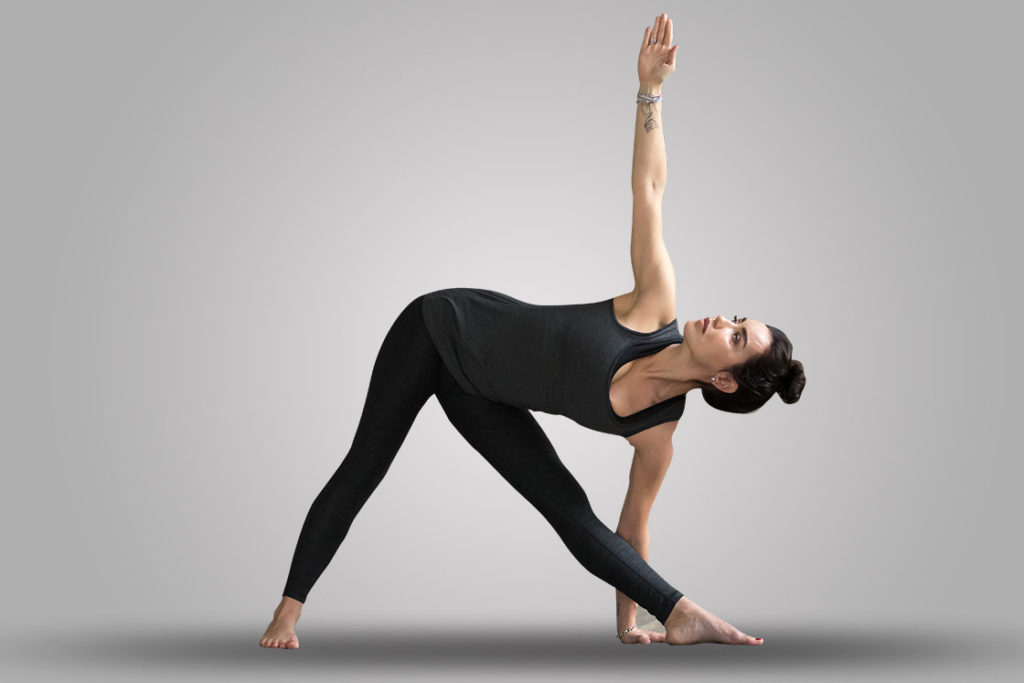
Stand in Tadasana (Mountain Pose) with your feet about 3-4 feet apart.
Turn your right foot out 90 degrees and your left foot in slightly. Align the heels of both feet with each other.
Raise your arms to shoulder height, parallel to the floor, with palms facing down.
Engage your core muscles and keep your chest open.
As you exhale, bend at your right hip and reach your right hand towards your right foot. Place your hand on your shin, ankle, or the floor, depending on your flexibility. Extend your left arm towards the ceiling.
Turn your head to look up at your left hand and open your chest towards the ceiling. Ensure your shoulders are stacked over each other.
Hold the pose for 20-30 seconds, breathing deeply and evenly.
Inhale and press into your feet to rise back to standing, bringing your arms down to your sides.
Repeat the same steps on the left side, turning your left foot out and your right foot in.
Return to Tadasana and take a few breaths to center yourself.
Precautions
Ensure your feet are correctly aligned and firmly grounded to maintain stability.
Engage your core muscles to support your lower back and maintain balance.
Avoid overextending your body; focus on reaching sideways rather than forward.
Keep your neck relaxed and avoid straining it; gaze can be directed either forward or slightly up, depending on your comfort.
Maintain even breathing and avoid holding your breath while in the pose.
If you feel any discomfort or strain, gently come out of the pose and adjust your alignment.
Contraindications
Avoid the pose if you have a recent or chronic injury to your back, neck, hips, or shoulders.
Do not practice if you have a headache, migraine, diarrhea, or are pregnant.
Skip the pose if you have low or high blood pressure.
Avoid if you have balance deficits or ankle, knee, or hip injuries.
Refrain from practicing if you have cervical spine pathologies.
Props & modifications
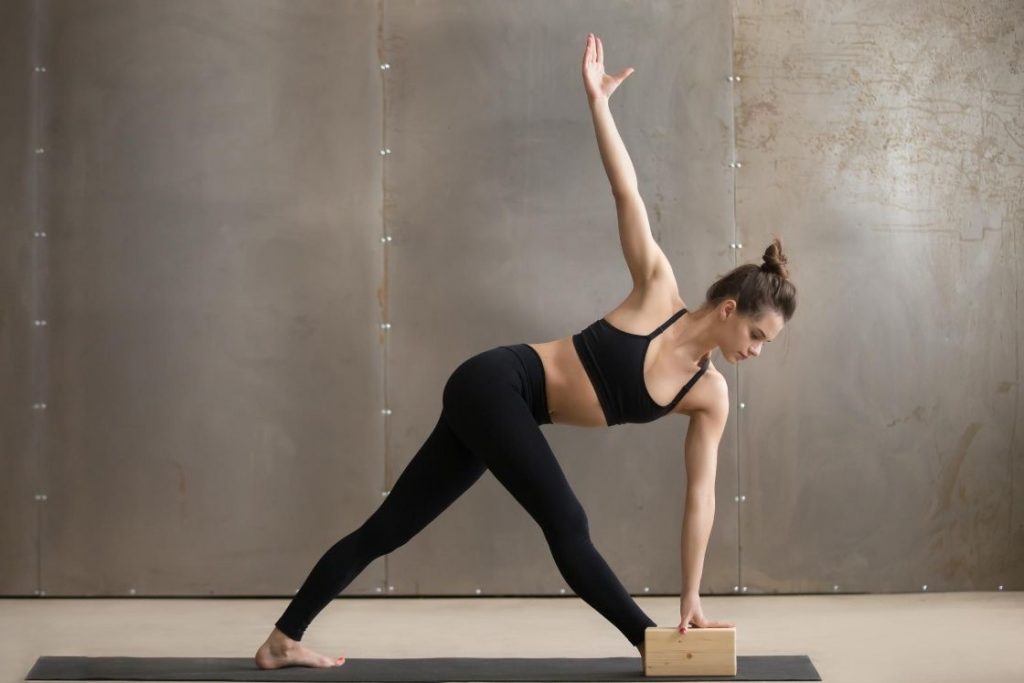
For beginners who cannot reach their ankles or the floor, Utthita Trikonasana can be practiced with a block.
Place a block next to the extended leg and adjust its height to where your hand can comfortably reach.
If you find yourself losing balance frequently, use a wall for support while practicing the pose.
Variations
By adjusting the hand alignment in Utthita Trikonasana, you can practice the following variations:
1. Baddha trikonasana
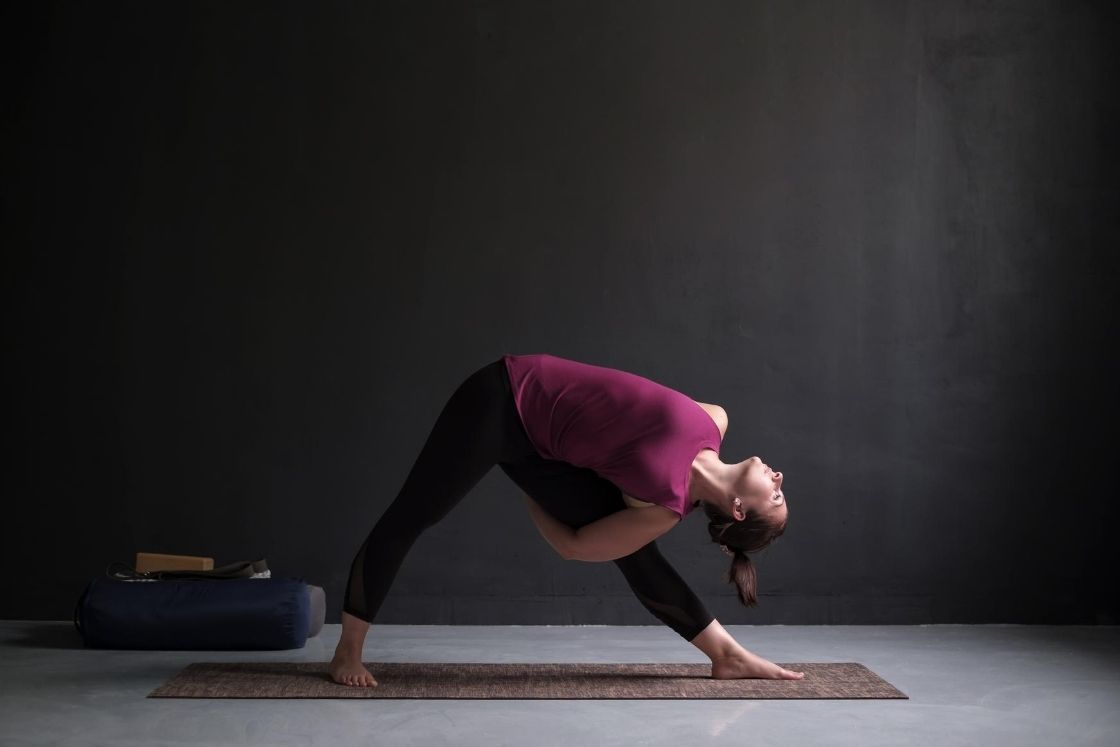
Baddha Trikonasana is an advanced variation that offers a deep chest stretch by opening the shoulders through wrapped arms around the torso.
2. Utthita trikonasana hand stretched sideways
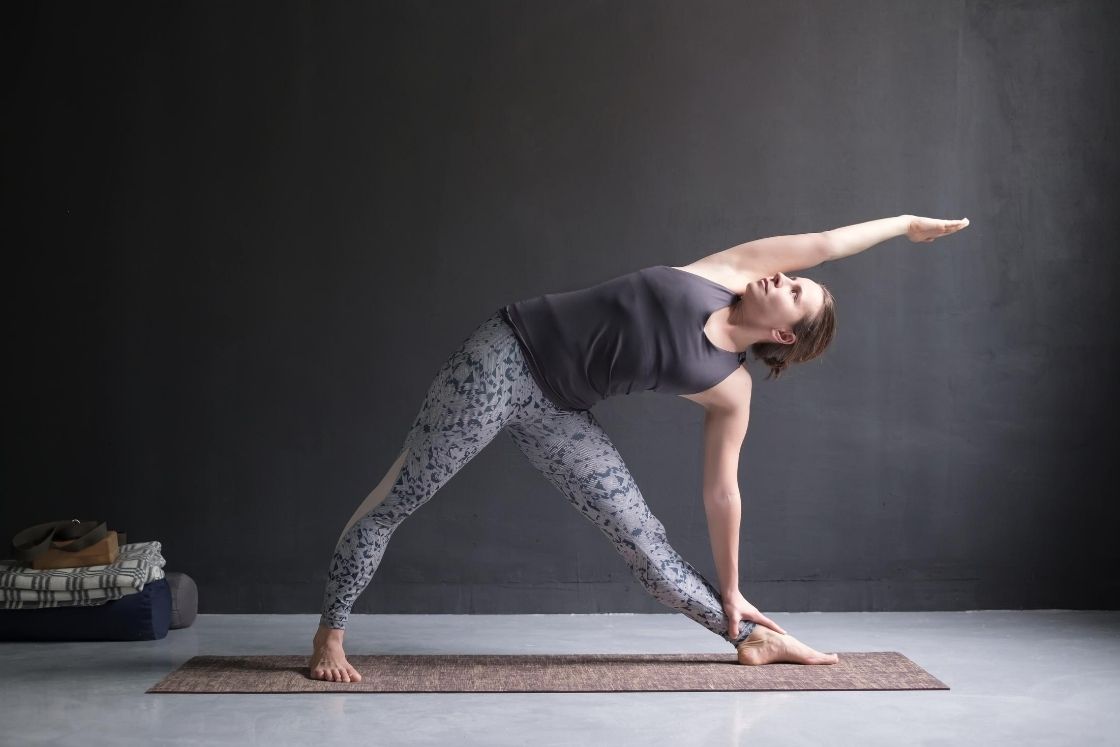
This variation involves stretching the hand sideways, providing a nice and lengthening stretch to the side torso. It is a suitable option for individuals with high blood pressure.
3. Utthita trikonasana hand stretched back
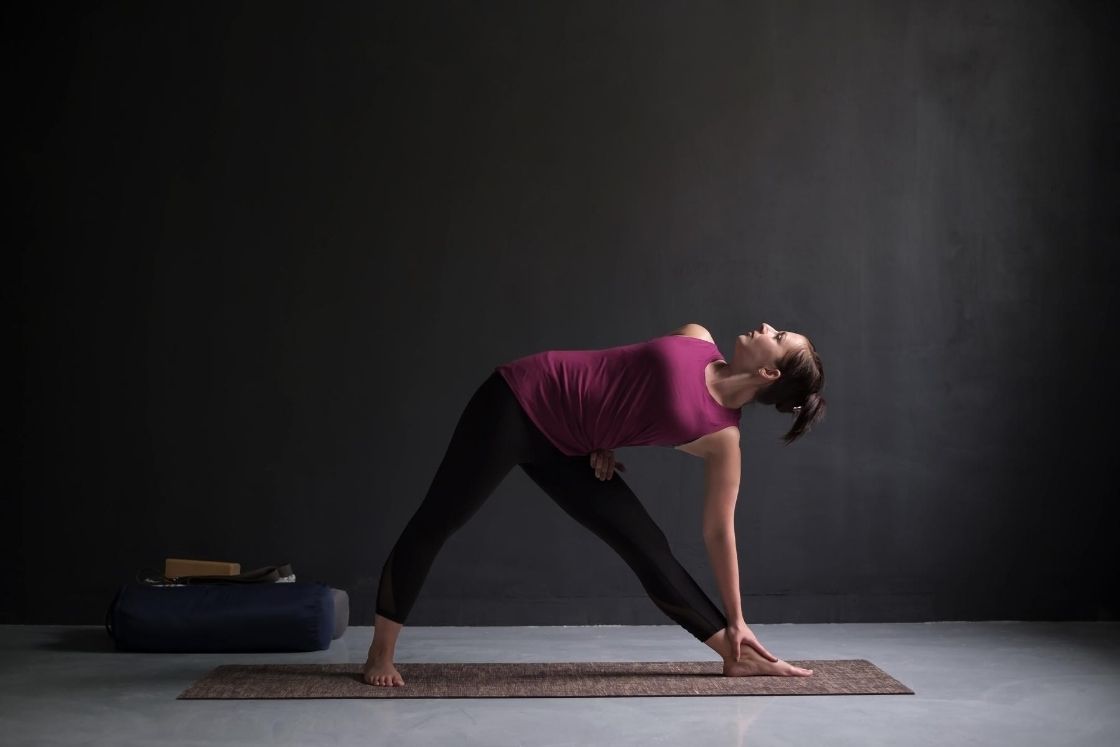
This preparatory variation involves extending the hand backward, preparing the body for more advanced poses.
Benefits utthita trikonasana
Utthita Trikonasana, or Extended Triangle Pose, is great for both body and mind. It helps open up your chest and shoulders, making it easier to breathe and reducing stress. Practicing this pose regularly can help you lose weight, improve digestion, and make your legs and hips stronger. It also boosts blood flow, helps with balance and focus, and opens up important energy centers in your body.
Improves Flexibility: Utthita Trikonasana stretches the hamstrings, calves, and hips, increasing overall flexibility in the lower body. This enhanced flexibility helps in performing other yoga poses and daily activities with greater ease.
Strengthens Muscles: The pose strengthens the legs, core, and back, building endurance and stability. Stronger muscles support better posture and reduce the risk of injuries during physical activities.
Expands Chest and Shoulders: Utthita Trikonasana stretches the chest and shoulders, which increases lung capacity and improves respiratory efficiency. By opening the chest, it allows for deeper breathing and helps to release tension in the upper body.
Stimulates Digestive Organs: This pose gives a gentle massage to your tummy area, which can help with digestion and reduce feelings of bloating. By doing this pose, you can support a healthy digestive system and feel better overall.
Supports Weight Loss: Practicing this pose stimulates metabolism and improves digestion by increasing the flow of digestive juices in the stomach. This enhances the body’s ability to process food and can contribute to weight management over time.
Improves Blood Circulation: The pose promotes better blood flow throughout the body by encouraging proper alignment and opening of the body’s energy pathways. This increased circulation helps to nourish tissues and improve cardiovascular health.
Opens Energy Centers: Utthita Trikonasana opens key energy centers or chakras in your body. Stretching the chest and arms helps activate the heart chakra, which promotes love and compassion. The pose also stimulates the sacral chakra, improving creativity and emotional balance, and the root chakra, which strengthens your sense of stability and grounding.
Conclusion
Utthita Trikonasana, or Extended Triangle Pose, is great for both body and mind. It helps to make your body stronger and more flexible, and it also improves your balance and focus. By practicing this pose, you connect with yoga’s traditional teachings, which can help you feel healthier and more peaceful. It’s a useful pose for increasing flexibility, building strength, and feeling calm. Try it out to see how it can help with digestion and boost your energy.




